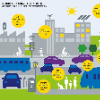This paper investigates the relationship between smart city initiatives and evolving urbanization trends in the United States. The research addresses the critical issue of rapid urban growth in the U.S. and explores how innovations within the smart city paradigm influence urban development. Utilizing principles from Urban Complexity Theory, this study identifies four key variables relevant to smart cities and their impact on urbanization: smart city technology, government policy, environmental sustainability, and socioeconomic factors. A mixed-method approach, combining quantitative and qualitative methodologies, was employed. A web-based survey (n=50) utilizing a five-point Likert scale was conducted among residents of Manhattan, New York, and Capitol Hill, Seattle. Results indicate that the implementation of smart city technologies is significantly associated with shifts in population density, land use diversification, and enhanced infrastructure dynamics. Additionally, residents demonstrated preferences for smart cities based on efficient urban mobility, environmental sustainability, and personal socioeconomic improvements. The findings highlight essential considerations for urban planners, policymakers, and employers. This study concludes that incorporating the identified influential factors into strategic urban planning optimizes city development to better accommodate growing urban populations.
翻译:暂无翻译



